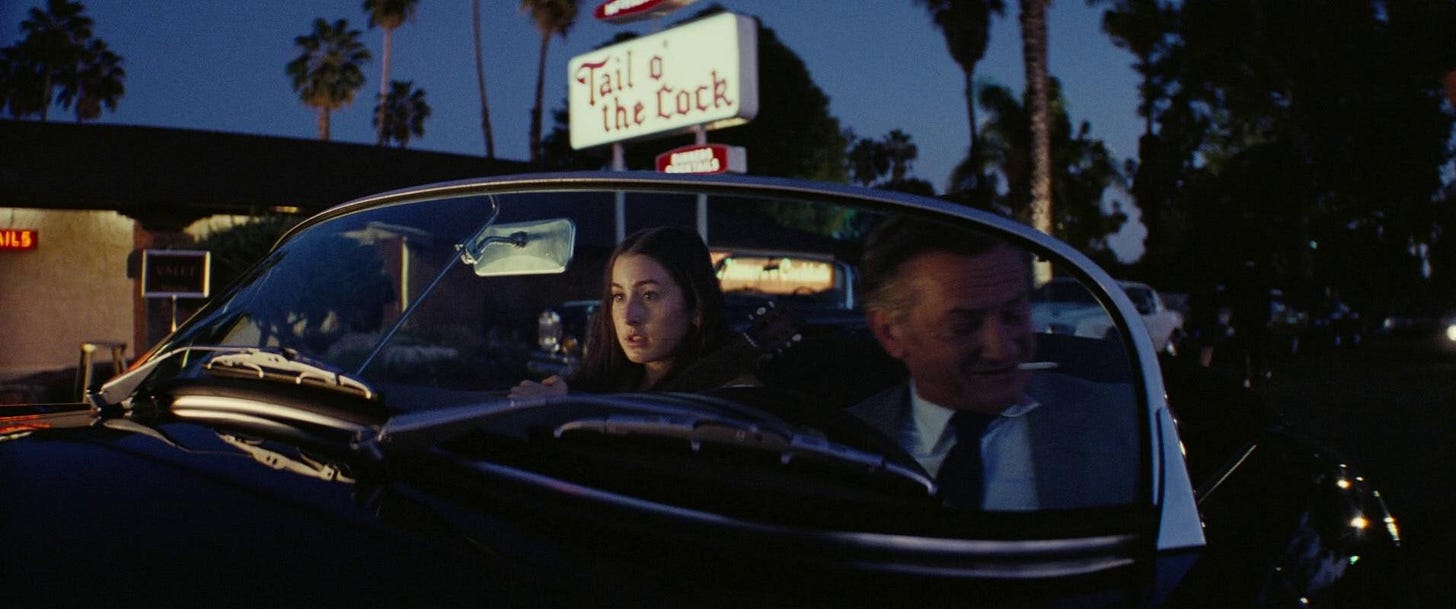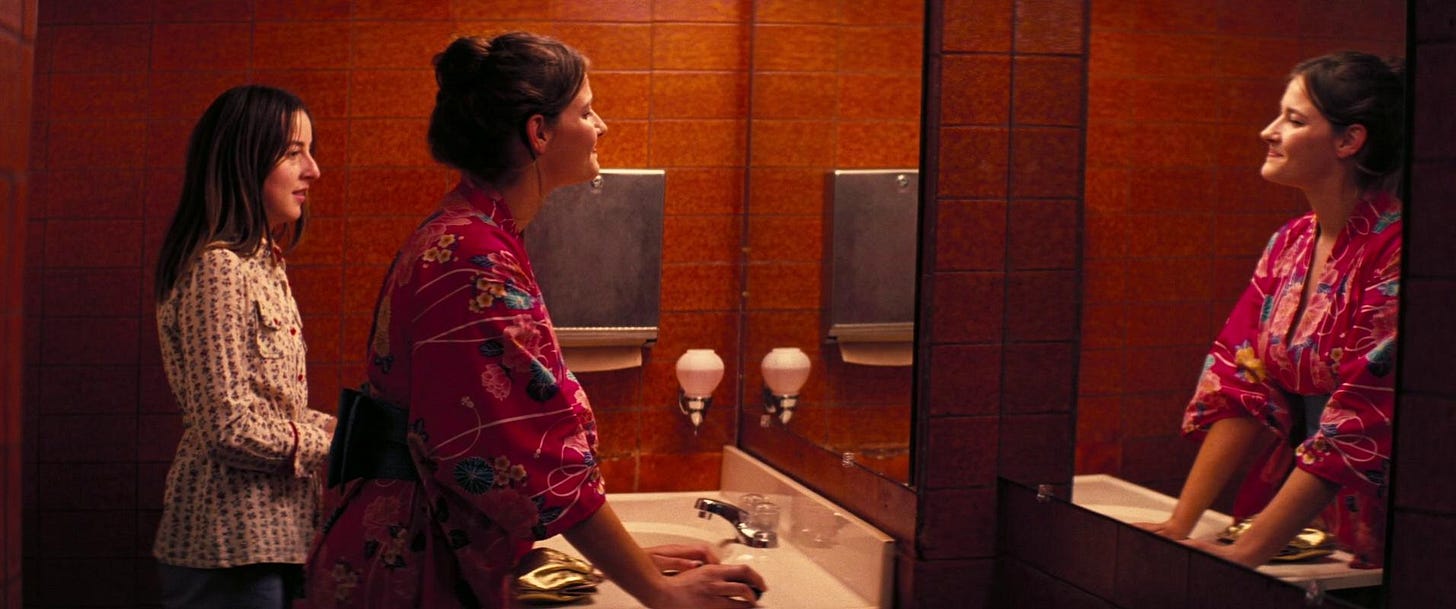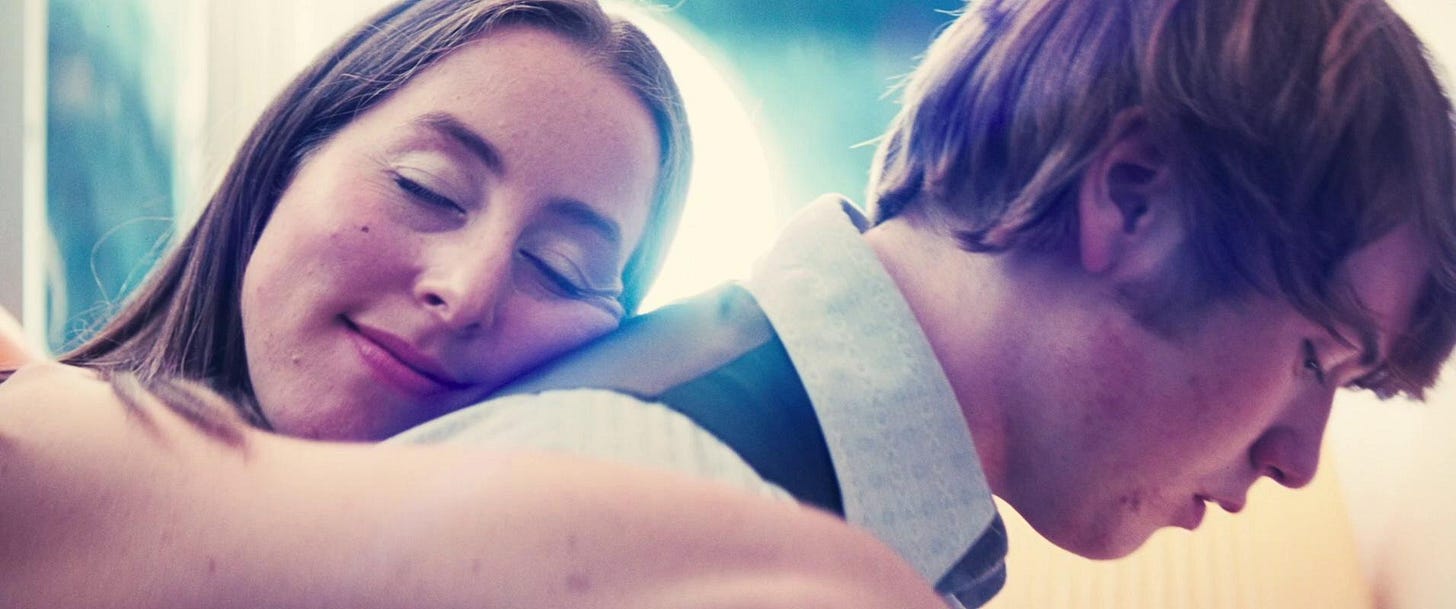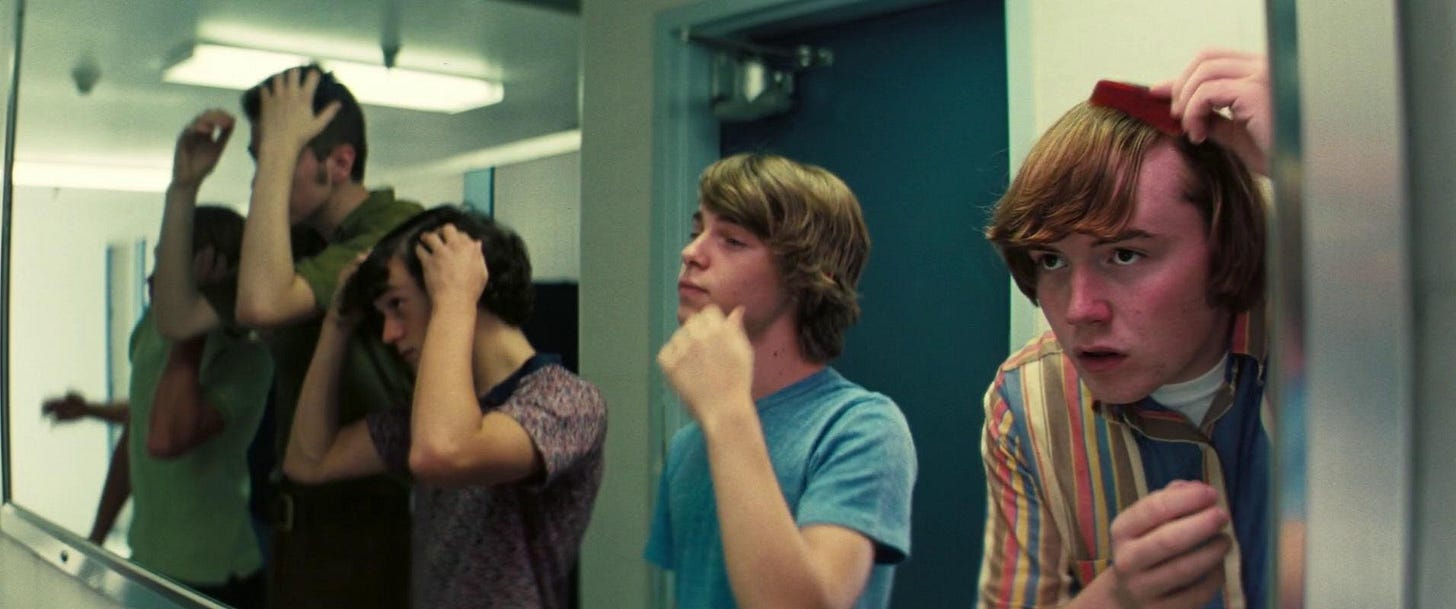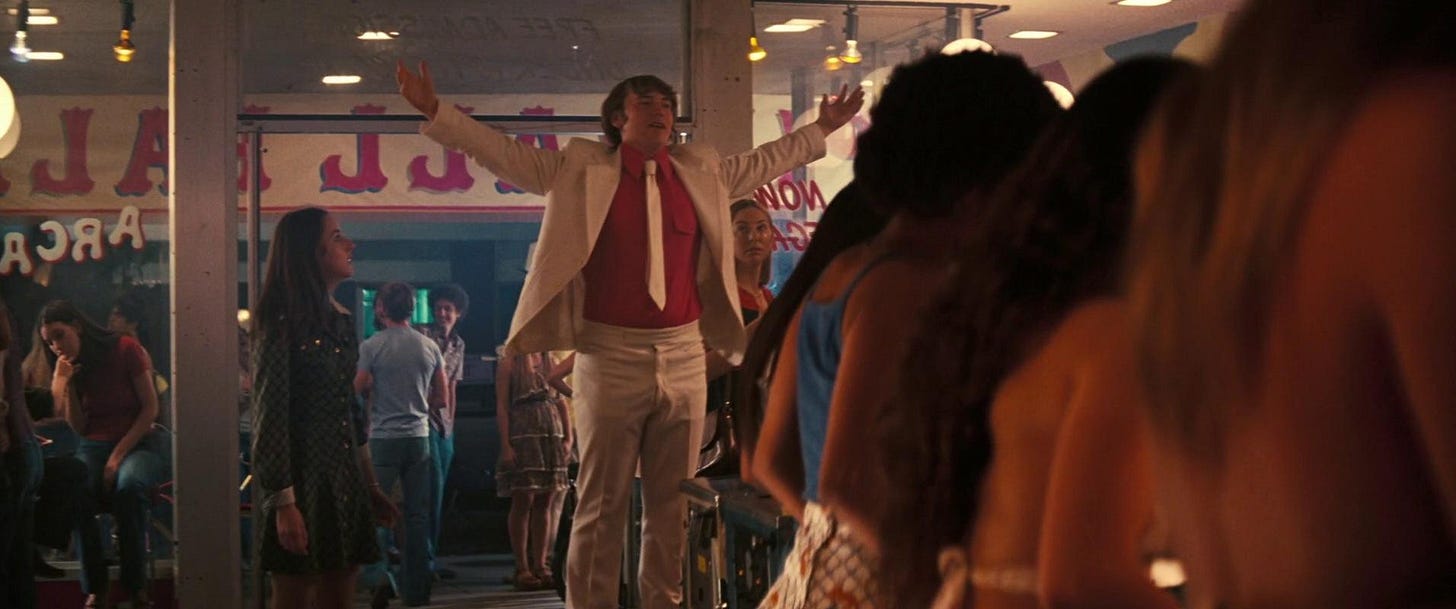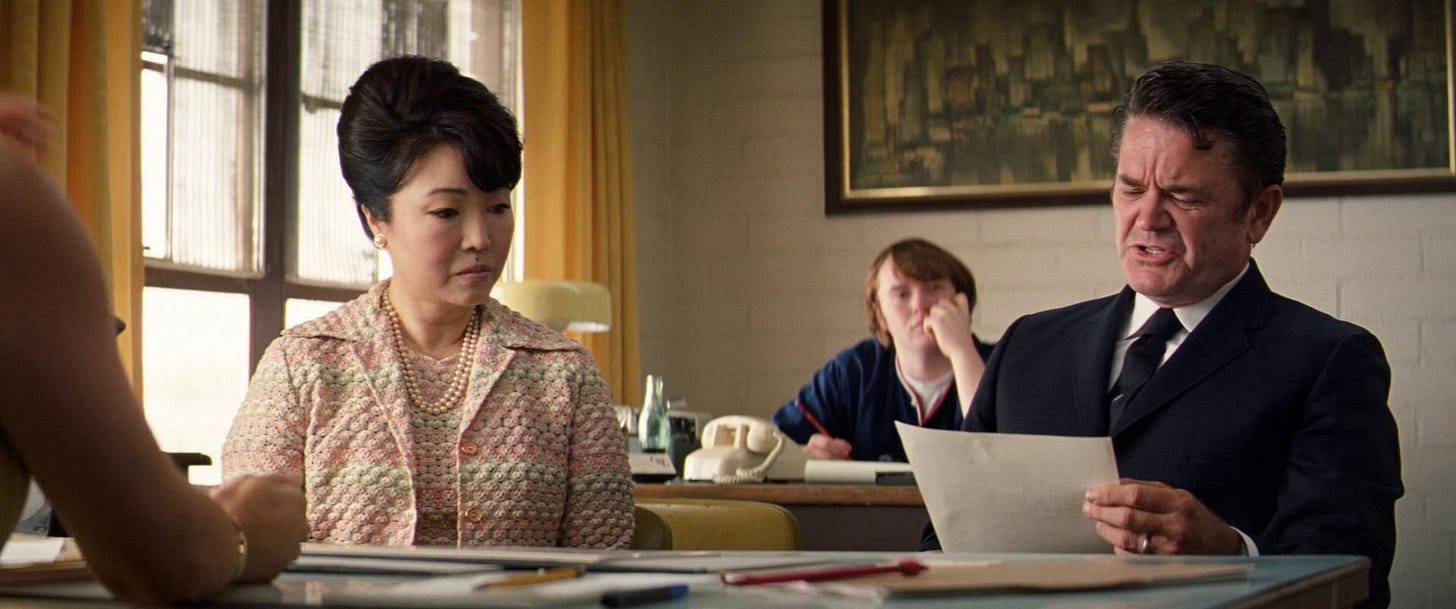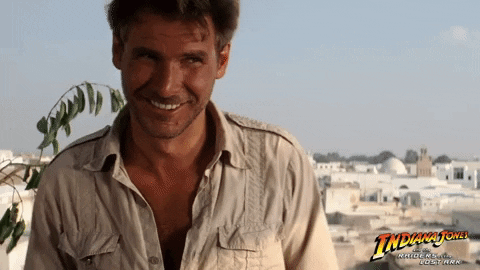Today, filmmaker Paul Thomas Anderson celebrates his 53rd birthday. If the name of this 11-time Oscar nominee doesn’t ring a bell, watch the clip compilation below for a tour through a filmography that extends from explosions of youthful energy like Boogie Nights to definitive American tomes like There Will Be Blood. (Or enjoy a refresher if you’re already a fan!)
Now that the dust has settled on PTA’s most recent film, 2021’s Licorice Pizza, I thought this would be as good a time as any to welcome Ethan Warren to the newsletter for a conversation. Besides his claim to fame editing one of my favorite pieces on Bright Wall/Dark Room, he's the author of the recently published The Cinema of Paul Thomas Anderson: American Apocrypha. If you’re looking for a rigorous but intelligible text that can break down the scholarship around Anderson’s films and provide a new lens for seeing them, this is the book for you.
Besides being the most qualified person I know to chat with about PTA, I was also curious to hear how Licorice Pizza was sitting with Ethan after about 18 months to digest. The film’s 2021 release ended up subsumed by controversy around its central relationship between Cooper Hoffman’s ambitious 15-year-old Gary Valentine and Alana Haim’s aimless 25-year-old Alana Kane. We tackle that subject head-on, as we do with the film’s racist Japanese accent — but in the context of the film itself and what Anderson might actually be up to here.
Ethan does a great job here of explaining a number of the themes he touches on in the book. He organized his text by these subjects rather than the films themselves, which I think helps tie them together. For a filmmaker whose work might seem rather disparate, Ethan has a nice framework to make sense of them as a series of three triptychs:
Thesis (1996-1999): Hard Eight, Boogie Nights, and Magnolia are “films defined by their hyper-verbose scripts and increasingly kinetic camera work, both of which represent an undisguised debt to other filmmakers”
Antithesis (2002-2012): Punch-Drunk Love, There Will Be Blood, and The Master are “characterized primarily by their stylistic opposition to his first, second, and third […] rather than works of thematic expressiveness, these are ones of emotional repression and increasingly oblique storytelling […] the nods to his influences become more ironically counterpointed and the construction of his narratives increasingly enigmatic”
Synthesis (2014-2021): Inherent Vice, Phantom Thread, and Licorice Pizza “represent a relaxation of the tendencies demonstrated in his previous three features […] these films embrace their own existence within a canon, and "(perhaps paradoxically) come to feel relatively unconcerned with the extratextual stakes of their existence”
As he details in our conversation, Licorice Pizza was somewhat shoehorned into an existing structure by virtue of Ethan’s publication schedule. I relished the chance to dig in a little deeper on some of the salient points in his book and try to make sense of something that might not need making sense at all … were it not from the mind of Paul Thomas Anderson.
Licorice Pizza is available to watch through Amazon Prime Video. Watch the trailer below.
What stands out to you when thinking about how Licorice Pizza fits in with some of the key themes you’ve identified within PTA’s canon?
Licorice Pizza has every Paul Thomas Anderson movie in it, that's my take on this movie. You could go any direction you want to, but the one that I find most interesting is the way that he approaches real history and facts. I'm fascinated by his approach to it, which lends my book the subtitle "American Apocrypha," this idea of sort of histories that are not true. Apocrypha is a term with a lot of deep religious connotations that I'm not as versed in as some people, but to me, it's just this idea of American false histories.
What he did with Licorice Pizza is that for the time, he was bringing in real people as opposed to characters he had loosely based on real people before. Daniel Plainview (played by Daniel Day-Lewis) is loosely based on Edward L. Doheny and, of course, Lancaster Dodd (played by Philip Seymour Hoffman) on L. Ron Hubbard. Now, for the first time, he was using real people and turning them into characters. He did this with Jon Peters (played by Bradley Cooper), Joel Wachs (played by Benny Safdie), and Jerry Frick (played by John Michael Higgins) in the hotly contested scenes — with good reason.
[Anderson] talked a lot for this movie about he saw himself as a shark and a vampire, and that was how he approached real fact. You take what you want, and you leave the rest lying on the floor behind you. He just loves to play fast and loose with real historical facts — for the reader, I'm moving my hands to show the Anderson multiverse — and that idea intersects with all of the movies. But in this one, he creates a mythical San Fernando Valley by taking real people and doing what he does to Jon Peters where he turns him into this mythic figure of machismo. Or Joel Wachs, even, is turned into a mythic figure in his own way of a tragically closeted politician. The Anderson approach to homosexuality is a whole bag of worms.
That's the history thing. What else? The San Fernando Valley thing is huge. It's his first movie set in the Valley since Punch-Drunk Love. But he made three movies in a row set in the Valley: Boogie Nights, Magnolia, and Punch-Drunk Love. He takes a break and comes back here. I really like to see this movie in conversation with Punch-Drunk Love because I see them as two sides of the same coin. They both depict the Valley in a very stylized way, but the heightened way of Punch-Drunk Love is very brutal, bleak, and removed. It's a very sterile world. There's nobody in that world. It's just white voids with these little blue and red people moving very often through it. Versus the valley of Licorice Pizza is just teeming with life.
The writer George Toles, who I really love, wrote a book just called Paul Thomas Anderson. He has this theory that you can see Lena (played by Emily Watson) in Punch-Drunk Love as the "mystical familiar" to Barry (played by Adam Sandler). I think too of the concept of "daemon" from The Golden Compass, these mystical little animals who ride around on their shoulders that are symbiotically and psychically attached to them. That is how George Toles sees Lena to Barry, this figure who is going to carry Barry through the Valley that is almost a tapestry. Lena is guiding Barry, as his mystical familiar, through these stations that he has to go through on his quest for enlightenment. I see Licorice Pizza the same way. I love that vision of Punch-Drunk Love, and I see these movies in conversations. I see Gary as playing exactly the same role for Alana. And I see Alana as going through exactly the same kind of tapestry with episodes that are little trials along her path to enlightenment ...or the acceptance of not finding enlightenment.
I remember talking with you before the trailer even came out, and most people steeped in Paul Thomas Anderson’s biography saw the potential for something drawing on biographical details or at least having a self-reflective quality. It’s now clearer that the Gary Valentine character is loosely based on the producer Gary Goetzman, but do you still see Licorice Pizza as being more personal than any of his other Valley-set films?
Well, it is for a couple of reasons. One, so much of it comes from real stories of people in his life. Not necessarily his real stories, but some of the stories from the Kane family's dinner table scenes are from the real Haim family dinner table. But then there's the fact that he fills the frame with faces that are dear to him. These are his kids' friends and his friends' kids. This is Tim Conway's kid, who went way back with his [Paul Thomas Anderson's] dad, this is Steven Spielberg's kid...
I clocked all the nepo babies! I mean, even Leonardo DiCaprio's dad George was the waterbed salesman.
Right, and the Anderson kids are in there. At one point, Gary brings a girl on a date to make Alana jealous, and it is SO clearly the child of Paul Thomas Anderson and Maya Rudolph. That's what those two faces look like put together.
The female perspective is something you go into great detail about in your book, discussing some of the limitations to the ways in which this very masculine-centered filmmaker portrays women. Do you think Alana is the protagonist of Licorice Pizza as PTA says she is? Is she a satisfying one if so?
It was so interesting to write this whole book and then have Licorice Pizza come out. He had been easing his way into the female perspective. He made three movies in a row — Punch-Drunk Love, There Will Be Blood, and The Master — that were about masculine repression and rage and men being beasts. Then, he lets the female perspective out a little bit more and more. Inherent Vice is told from a female perspective that is Sortilège's (played by Joanna Newsom) memory play, effectively. (Depending on whether you believe Sortilège exists or not, which is a whole fun thing to think about!) Phantom Thread is told from Alma's (played by Vicky Krieps) perspective. She could be arguably the protagonist.
But I think Alana is the protagonist of Licorice Pizza though. You know very little about Gary at the end of the day. He's a bit of a mystery. You spend a lot more time in Alana's home than Gary's. Where's Gary's dad? We don't even know! It's Alana that's on a journey. Gary is just sort of trucking along, following his bliss from day one. He's kind of the same character from the beginning to the end, maybe a little bit older and wiser but really just running the same schemes again and again. And how much time does this movie cover, like less than a year? He's 15, he's still 15 at the end of the movie. Alana, as the young adult in the movie, is the one who is going through more of a journey of personal growth. That personal growth does kind of just end up being, "Maybe I should date a 15-year-old."
It was remarkable to rewatch the film after the inane "discourse" around its endorsement of pedophilia or grooming. Not that I want to relitigate that, but I’d love for you to elaborate on the connections between the ending and the subversive source of its dedication: Robert Downey, Sr.
The film is dedicated to Robert Downey, Sr. He has a habit of dedicating his films to his mentor who died most recently. So Phantom Thread is dedicated to Jonathan Demme; Altman, There Will Be Blood; his father and Robert Ridgely, Boogie Nights. Downey — obviously, the father of Robert Downey, Jr. — was a huge underground filmmaker of the '60s and '70s who made very transgressive social satires. He had a very loose relationship to plot, production values, sound ... and coherent images. He pushes the boundaries, and he is a huge influence on Anderson. But not necessarily in the transgressive [element].
I'm going to shift your point over to somebody else. Anderson's dad was the TV host Ghoulardi, a late-night horror host in Cleveland. He had some slogans when he presented late-night horror movies and dressed up in funny costumes and did firecrackers. One of his catchphrases was "Stay sick." And I like to say that the influence of Downey on Anderson is this idea that you can be healthy by staying sick. It runs through a lot of Anderson's work, particularly Phantom Thread and Punch-Drunk Love, two movies that are about toxic romances. Those are his two most transgressive movies — well, I guess Licorice Pizza is really his most transgressive because it's about an adult dating a 15-year-old.
The thing that Anderson really takes from Downey is the idea that you follow your own bliss. You can be selfish by just making movies that make you happy, and you don't have to worry too much about other people's perspectives. Because if you just follow your own rhythms, you can trust that probably there's an audience for it by really staying true to yourself. His examples are things like Greaser's Palace where there are these agonizingly long Sideshow Bob rake gag sorts of things. This brutal anti-comedy is as uncommercial as possible, but it makes Downey laugh. It makes Anderson laugh, and it makes a lot of other people laugh, including me.
And it makes somebody else laugh: his name is Jonathan Demme.
I see a lot of resonance between Licorice Pizza and some of the early Demme stuff where he was pushing for more radical rearrangements of social mores. He made a couple of movies with throuples as the endpoint: Citizens Band [also known as Handle with Care] and Crazy Mama. That's sort of radical for the seventies! Crazy Mama is this puzzle of a weird, unusual family unit, which is so very Andersonian.
But if Licorice Pizza is probably his most genuinely transgressive movie with this romance, age gap, pedophilia, and whatever ... he was asking for it! That's the movie, it's a transgressive thing. It's kind of fun, and that really reminds me of these Demme movies where he said, "Whatever! Why does it have to be one man, one woman?" In this case, it's, "Whatever! Why do they have to be two legal adults?" Depiction does not equal endorsement, and RTs do not equal endorsement. Things I say do not reflect my personal perspectives!
The sublimated Demme and Downey influence seems to dovetail very nicely with kind of where Anderson has headed in his career anyways. He has become a lot less overt when paying homage and instead just doing something that he likes. Licorice Pizza is probably the hardest of his movies to pin down to any specific filmic influence. I would have a hard time programming this as a double-bill with anything, except for maybe American Graffiti, which is very different in a lot of key ways.
You took the words right out of my mouth! The opening titles are an homage to American Graffiti, and the first shot with the cherry bomb is lifted straight from there. I agree with you, it's the one with the least overt references. And it's right on the heels of Phantom Thread with some of his most overt references. That's his Alfred Hitchcock mash-up with Psycho, Rebecca, and Vertigo all swirling around.
His relationship with [references] just gets more and more interesting. Hard Eight is a clear David Mamet thing, and that's kind of a dead end analytically. Same with Scorsese and Boogie Nights. With Singin' in the Rain and Boogie Nights, it's a little more fun. But at the same time, it's right there. I get it. Then, he starts building things so that they're more and more worthy of analysis. Punch-Drunk Love is an MGM movie musical, which is fun. Let's talk about that!
He continues to, in some cases, be pretty brazen. At the beginning of The Master, the returning soldiers are being debriefed. That is taken directly from a movie by John Huston called Let There Be Light. He is recreating it shot-for-shot, line-for-line. But he's shooting it in the Anderson lens, and it's fascinating. It's not a dead-end at analysis anymore. It is much deeper and richer. [You see] the same thing with Inherent Vice where you have the influence of underground comics. He's literally building his frames as though they are panels of underground comics, I love that stuff. And then in Licorice Pizza, it's just a movie. It's not pure cinema by any means, but it's definitely got the least other thumbprints on it.
Do you feel like his use of music changed along with it? In Licorice Pizza, he seems to be pulling so much less from needle drops as easy cultural shorthand or scene transitions. Just that opening shot of Alana and Gary walking as a Nina Simone song drops in and out shows a deeply complex understanding of how music accompanies and comments on a scene.
I was rewatching that opening, and it's crazy how well it syncs up. It's these very long shots. Like how did he time it so perfectly? I mean, I guess if it was very long shots, you just know you've got to get from point A to point B along to this song. It almost feels like they must have had playback on set, but they couldn't have because it's dialogue. And it's such an eerie soundtracking choice. If we were still in Boogie Nights, it would be some prog-rock track. And there's so much hokey music on that soundtrack ... "Ac-Cent-Thu-Ate the Positive?!" It's not a soundtrack that you want to keep in constant rotation in your car necessarily like the Boogie Nights one. His use of the needle drop is so specific.
It's so interesting that he uses [David Bowie’s] “Life on Mars.” What a familiar song! And he does the same with [Paul McCartney’s] “Let Me Roll It.” He just picks these iconic artists, steps up, and is like, "These ones are mine now. You don't get to use these for at least 20 years." And I thought “Life on Mars” belonged to Wes Anderson before this from The Life Aquatic, but I think PTA's got it now.
It's funny, a lot of these guys used to be thought of more as soundtrack-y artists. That was this whole concept in the '90s when you could still move CDs and have that be a secondary revenue driver. Like Quentin Tarantino with Pulp Fiction, the soundtrack was a huge part of the sales. They were hoping Boogie Nights was going to do the same thing. I think Anderson was in the conversation with Cameron Crowe and Wes Anderson, like these guys do their soundtracks would be your next "obsession." It's not so much that anymore, but maybe soundtracks aren't so much our obsessions anymore.
Tying this discussion of music back to the Valley, I think the biggest change for Anderson from Punch-Drunk Love to Licorice Pizza is his working relationship with HAIM directing their music videos. It's like they made him see his home with new eyes again. Do you see them as a muse to him?
His relationship with the female voice is so interesting. Fiona Apple, certainly, another subject of his music videos. Aimee Mann was certainly a muse. I think he said that Magnolia should be considered an adaptation of her songs, and some people really see her voice as an essential character in that movie. Again, that's a George Toles concept that the female voice really comes through in the soundtrack of Anderson's movies. In The Master, there's an almost subliminal pulse of the female voice in the old standards that are being heard in the soundtrack.
HAIM, I just think he should be so grateful to them for enlivening his relationship with the Valley. He had such a contentious relationship with the Valley at the beginning of his career. He wanted to make movies about it, but Boogie Nights and Magnolia he called "fuck you celebrations." That's kind of a contradiction of terms! You feel that a little bit. Those are movies that don't feel a deep breath of joy in their settings. You can't find a lot of stuff to take place outside. I was looking for screenshots of exteriors, and the only exteriors in the movie are the backyard of Jack Horner's house [in Boogie Nights] and the gas station at the end of Magnolia when Bill Macy's got his face bashed in. You don't see a lot of the Valley. You see a lot of the Valley in Punch-Drunk Love and Licorice Pizza.
The Valley of the HAIM videos is so liberated. It is so ecstatic, which is a term I really love using with Anderson it is so ecstatic. If you look at "Summer Girl," when they're marching through the streets of the Valley just removing layer after layer of clothes, it's this liberated view. Or the "Little of Your Love" video, you see Danielle walking through the blue-tinted Valley, going to the bar, and just walking straight into a choreographed line-dance thing. It's beautiful.
He was at a little bit of a turning point when he met them. He has used the term a couple of times in his career of "getting sick of his own voice." He got sick in his own voice around the time of There Will Be Blood, he found Upton Sinclair. He got sick of his own voice around the time of Inherent Vice, he found Thomas Pynchon. And he found HAIM, which was more around the time of Phantom Thread. He met these people who were so aligned with him … and whose mom was his art teacher. It's so funny! And I think they were introduced by Jorma Taccone's brother?! He overheard them say something at a party and said, "You should talk to Paul Thomas Anderson." The Valley just sounds like a high school.
Thinking of Philip Seymour Hoffman, another seminal figure in the Paul Thomas Anderson canon, how do you conceive of the meta text with Cooper Hoffman? The role doesn’t seem to have been written for him, and yet there do seem to be some intriguing parallels to analyze — not only in his own life but within Anderson’s own canon of fathers and sons.
I have this suspicion that he was looking at Skyler Gisondo and shunted him over to the other role [of Gary’s costar Lance Brannigan, a would-be rival for Alana’s heart]. He'd be the lead in a more conventional version of Licorice Pizza. But Anderson has talked about auditioning a lot of people, seeing a ton of Hollywood-y guys, and feeling like he wanted somebody who was natural and unstudied. He claims that he tried to talk himself out of casting Cooper Hoffman and said, "Why are you trying to ruin this kid's life?" But he felt he had this untapped resource at his disposal, this kid who had such Gary energy. And it is just so beautiful, the idea that he's known this kid his whole life. He has become the Jack Horner of his own little world, at this point, he is exhausted. I saw a tweet today — I say like I’m citing a scholarly source — that said he has become the daddy of his own world. He is daddy if you look at Licorice Pizza, where he's cast all of his kids' friends and his friends' kids.
I want to know what his next fucking movie is going to be1! Because what direction is he headed after this one? It feels like this is such an interesting movie that was made in such an interesting way with no cinematographer. It's a COVID movie, which is partially why it's all friends of friends and kids of friends. But then again, when we had Phantom Thread, on the other hand, it was like, "Where's THIS headed?" Because he's now he's making movies in England. He's always zigging and zagging!
I like the way you have a very neat division of his filmography into three triptychs. Do you find Licorice Pizza a satisfying capper to this "synthesis" period as Magnolia and The Master were to their respective eras?
It's perfect. If he never made another movie, he would have left this perfect nine-film cycle. I see these past three movies in conversation with the three movies that came before, and Licorice Pizza puts a perfect cap on that. As I said, this is the one that's in conversation with Punch-Drunk Love. It's very easy to see Inherent Vice in conversation with The Master because Joaquin Phoenix is in both of them, and it's very easy to see Phantom Thread in conversation with There Will Be Blood because Daniel Day-Lewis is in both of them.
I see both of those pairs of characters in conversation with each other. You go from [Phoenix’s] Freddie Quell, who is this very repressed, coiled, alcoholic character, to Doc Sportello, who is this loose, stoner character. You go from [Day-Lewis’] Daniel Plainview, who is this brutal character, to Reynolds Woodcock, who is this genteel character. Then you go from the repressed, coiled Valley of Punch-Drunk Love to the ecstatic, sprawling Valley of Licorice Pizza. It's the perfect endpoint.
I wrote this whole book without Licorice Pizza having come out, and then it had to roll into it. It was just such a perfect capstone to everything. This gave me nine movies, and I wanted to break them up into groups of three. I wrote the whole book 3-3-2 and said just don't worry about the fact that there's no third movie. Then, it came out, and it just tied the room together.
As a fan and student of his work, what do you want to follow the “synthesis” period?
I want to see him not make so many movies about straight white people. I want to see what it would be like if he actually challenged in that department. Okay, maybe the argument is that straight white people should just make movies about straight white people. But, at the same time, he's been a little bit questionable at certain points in his career when it comes to demographic specificity and depiction.
When Magnolia came out, he was criticized for showing a vision of the Valley that was overwhelmingly white. Licorice Pizza, similarly, was an overwhelmingly white vision of what is actually a very ethnically diverse area. There would be more color in the tapestry of these movies than he created, and he has been dinged for that. Now there is this suspicion that he is making a movie set in the old jazz world with Denzel Washington. I wonder if maybe that's an overcorrection, but I'm curious what that could look like.
Do you feel the film does have some elements, however imperfect, of responding to the criticisms of his racial and gender representation that you detail in the book?
I wonder how much he is really aware of that stuff. I wonder what his kids say to him. I wonder what the conversation around the dinner table was like when that fucking Jerry Frick scene happened!
That scene, we return to it at last. It's two scenes with the Japanese accent, which again, this is a REAL person. I find those scenes reprehensible. I don't think anybody loves them because they're just not funny! It would be one thing if they were funny.
And he's done silly comedy before, like mimicking the Zucker-Abrams-Zucker style with Inherent Vice. Those comedies can be crass and the lowest common denominator sometimes, but they do require a genuine level of artistic skill to pull off visually. Here, it's just a white guy speaking in a bad Japanese accent. It's not funny, and it's very easy.
And it just goes on and on! There's only one beat to it. But when he was pushed on that, his response was basically just like, "Oh, Jesus, leave me alone!" There's this Kyle Buchanan interview where he just throws up his hands and has some mealy-mouthed thing about like, "I can't separate what my intentions were from how it was received." Like, okay, Paul. And then, Maya Rudolph's stepmother is Japanese, and he has claimed this stuff happens to her by the way. Like, does it, Paul?! Does THAT happen a lot?
If it does, it doesn't need to be dignified with a scene that treats it so uncritically.
That thinks it's hysterical! It's so weird. He sets these movies in the '70s, and so there's just this little bit of like, "Well, it's the '70s, what are we gonna do?" In the same way, in Inherent Vice, the only Asian character is a hooker, and the only Black character is a Black Panther ex-con. But it's the '70s and a pastiche, so he gets away with it that way.
I would love for him to make a movie with a gay character who is not punished for being gay. He's got his little triptych of gay characters: Scottie (played by Philip Seymour Hoffman) in Boogie Nights, Donnie (played by William H. Macy) in Magnolia, and Joel Wachs [in Licorice Pizza], all of whom are in their own ways punished for the sin of wanting to be functional human beings who love men. It's in perhaps more outsized ways with Scotty and Donnie who are really punished as characters. With Wachs, I think Anderson invented that boyfriend character [Matthew, played by Joseph Cross, who reveals Wachs’ sexuality in the film’s final act over dinner with Alana]! That's not from real life. There was no boyfriend at that time. There was no conflicted "Why won't you be seen with me?" thing. It's such a huge thing to make up2 that it makes you wonder what Anderson's game was with that.
I think you sum up how he tries to have it both ways in the book: "Retrograde choices count as tribute, and any contemporary touch can be celebrated as subversion."
You also asked about something that I then completely didn't address, which is the depiction of women. I wonder if it is a little bit in response to some of the criticisms. In some cases, he elides the female perspective, and it feels to me like that's the worst of it. In Punch-Drunk Love, Lena is such a thin character. Citation needed, but somebody reviewing Boogie Nights said, "It's only not misogynistic because everyone is an idiot." But Phantom Thread, that movie was accused of celebrating toxic masculinity and being a little misogynistic. Get out of town, I think, on that one. I think that movie has a rich female perspective. And I think the increasing Andersonian female perspective is something that comes to fruition in Phantom Thread. Maybe it's in response to criticism, but maybe it is just a genuine flowering that will lead to a greater broadening of his worldview.
You note in your book that the general trend of Anderson's writing has gone from overt to covert expression. It's not that you understand the characters less as they say less. Rather, it's that he's able to convey so much more through what they do say, and maybe this has made him more able to write women.
You think of Dirk (played by Mark Wahlberg) screaming in Boogie Nights, "It's my big dick and I want to fuck now!" or asking Amber (played by Julianne Moore), “Are you going to be my mom?" These are not subtle screenplays. Then you have something like There Will Be Blood where the true feelings of those characters are often in direct opposition to the dialogue. These are characters who are one thing on the surface and something else underneath.
And then you have Alana Kane, who is a declarative character but also has these depths. This is the synthesis, there are both overt and covert expressions. Alana, she says everything and she says it twice, as Gary points out in that opening scene. I have never remembered to track whether that tick goes on. I suspect he drops it. She is very expressive that way. But, at the same time, why is she doing the things she is doing? Why is she at that bar with Jack Holden (played by Sean Penn)? That is not clear. What is going on when she is taken with Jon Peters all of a sudden? There are things going on under the surface. She's an interesting character.
"I don't know" is a phrase I oftentimes think is the crutch of the lazy screenwriter. And it's very rare to have a character like Alana who can say "I don't know," and you actually believe it.
That's interesting because that's the catchphrase of Barry in Punch-Drunk Love. He says "I don't know" compulsively.
Final question: something central to much of your analysis is bits of deleted scenes or cut lines from the script — has anything emerged from the Licorice Pizza vaults that has shifted your read on the film?
The screenplay has not been circulated yet, which is so frustrating to me. The screenplays are so revealing. I don't think anything has come out except whatever was going on in the Jon Peters scene with the squeegees and the mirrors that only got relegated to the end credits. Apparently, they didn't want to leave Gary and Alana's perspective because they had left the scene by then. It breaks the logic of the movie where you're always with one or the other of them. But he got a great trailer scene!
No, I don't know anything that was cut. I'm just thinking in terms of apocrypha, there are realities of it like how Gary Goetzman actually went to Jon Peters' house and installed a waterbed. In reality, that was just a nice installation, he was a good guy, and he went home.
Thanks again to Ethan Warren for his time and acumen in putting together this tribute. You can find him on Twitter at @Ethan_Warren_, and while he's on hiatus at the moment, you should also subscribe to his Substack
. Catch up on all his great Elvis writing from last year, even if you can’t stand the movie like me!A fun one coming for everyone later this week — not the Indiana Jones newsletter you might be expecting.
Yours in service and cinema,
Marshall
Since this conversation, IndieWire broke the following: “Anderson’s mysterious next movie, rumored to star Joaquin Phoenix, Viggo Mortensen, and Regina Hall, has been set up at Warner Bros.”
Ethan would have you know: “When I said ‘it's a huge thing to make up,’ for the reader, I held up my hands so it's really huge.”







